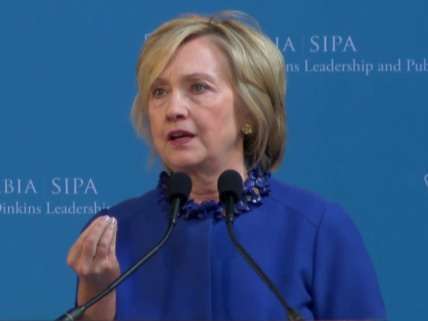Jacob Sullum on Hillary Clinton's Sudden Interest in Criminal Justice Reform

Last week Hillary Clinton delivered what The New York Times called "an impassioned plea to mend the nation's racial fissures and overhaul an 'out-of-balance' criminal justice system." In a speech at Columbia University, the Democratic Party's presumptive presidential nominee noted that "the United States has less than 5 percent of the world's population" but "almost 25 percent of the world's total prison population." The former secretary of state observed that "a significant percentage" of the country's 2 million prison and jail inmates "are low-level offenders." She bemoaned the racially disproportionate impact of America's eagerness to lock people in cages, saying "a third of all black men face the prospect of prison during their lifetimes." Clinton said this situation cries out for reform. "It's time to change our approach," she declared. "It's time to end the era of mass incarceration."
For critics who have long argued that our criminal justice system puts too many people behind bars for too long, Clinton's words of outrage were welcome. But they were also hard to take seriously given her history on this issue. While condemning overincarceration, she glided over her own role in promoting it and exaggerated her efforts to correct it. She referred only obliquely to the war on drugs, which has played an important role in sending nonviolent offenders to prison. And three decades after the prison population began the dramatic climb that she now considers shameful, Clinton offered almost no specific ideas for reversing it, which makes her look like a dilettante compared to politicians in both major parties who have given the issue serious thought.


Show Comments (0)